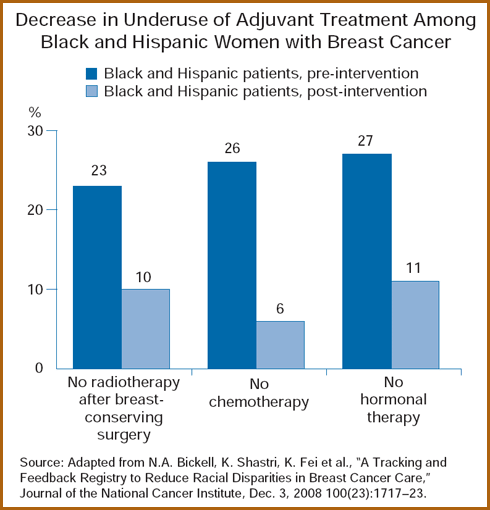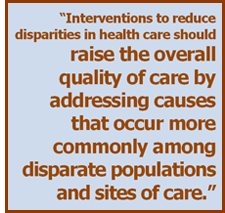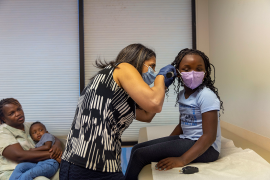An abstract is available at:
http://jnci.oxfordjournals.org/cgi/content/abstract/100/23/1717
Synopsis
A patient tracking and feedback registry used by a group of New York City hospitals for treating breast cancer patients improved rates of oncology visits and increased rates of associated treatments. It may also help eliminate previously observed racial disparities in breast cancer treatment.

The Issue
Studies have demonstrated that black and Hispanic women with early-stage breast cancer who undergo surgical treatment are less likely than white women to consult oncologists and receive effective adjuvant therapies, such as radiation, chemotherapy, and hormonal therapy. System failures occurring when patients agree to a surgeon's recommendation to meet with an oncologist but do not comply with the recommendations are the most common barriers to receiving such therapies.
Key Findings
- Overall, implementation of the tracking and feedback registry was accompanied by increased rates of oncology consultations, chemotherapy, and hormonal therapy compared with the pre-intervention group. Radiation therapy rates were unchanged.
- The overall percentage of breast cancer patients who visited an oncologist rose from 83 percent in the pre-intervention group to 97 percent in the post-intervention group. Underuse of adjuvant therapies fell from 23 percent to 14 percent overall.
- Following implementation of the intervention, the percentage of black and Hispanic women who completed an oncology consultation rose from 86 percent to 96 percent. The rate of adjuvant underuse fell sharply among black and Hispanic women, from 30 to 13 percent; the decrease in underuse among white and Asian women was smaller (19% to 15%).
- The greatest declines in adjuvant therapy underuse were observed in municipal hospitals, where underuse fell from 39 percent to 13 percent.
Addressing the Problem
 The tracking and feedback registry used in this study targeted system failure, a common cause of adjuvant underuse among minority women, by informing surgeons about whether patients had acted on referrals to oncologists. This intervention, the authors say, would be most successful in a closed delivery system or single hospital where gaps in follow-up care occur. They also suggest that a registry could help tumor registrars (health care professionals who collect data on cancer diagnoses) improve the quality of care by tracking connections and giving feedback to surgeons. Health insurers should consider requiring medical oncology consultations for breast cancer patients, the authors add, as those seeing oncologists are more likely to get treated.
The tracking and feedback registry used in this study targeted system failure, a common cause of adjuvant underuse among minority women, by informing surgeons about whether patients had acted on referrals to oncologists. This intervention, the authors say, would be most successful in a closed delivery system or single hospital where gaps in follow-up care occur. They also suggest that a registry could help tumor registrars (health care professionals who collect data on cancer diagnoses) improve the quality of care by tracking connections and giving feedback to surgeons. Health insurers should consider requiring medical oncology consultations for breast cancer patients, the authors add, as those seeing oncologists are more likely to get treated.
About the Study
The study compared oncology consultations and adjuvant therapy use among 639 women with newly diagnosed stage I or II breast cancer who received surgery between 1999 and 2000, prior to implementation of a tracking and feedback registry, and 300 women who received similar surgical treatment between 2004 and 2006, after implementation. Six New York City hospitals, including 51 breast cancer surgeons in the pre-intervention group and 28 in the post-intervention group, participated in the study.
The Bottom Line
A tracking and feedback registry that closes the referral loop between surgeons and oncologists may offer a simple and efficient mechanism to improve treatment outcomes among women with early-stage breast cancer and eliminate racial disparities in treatment.


